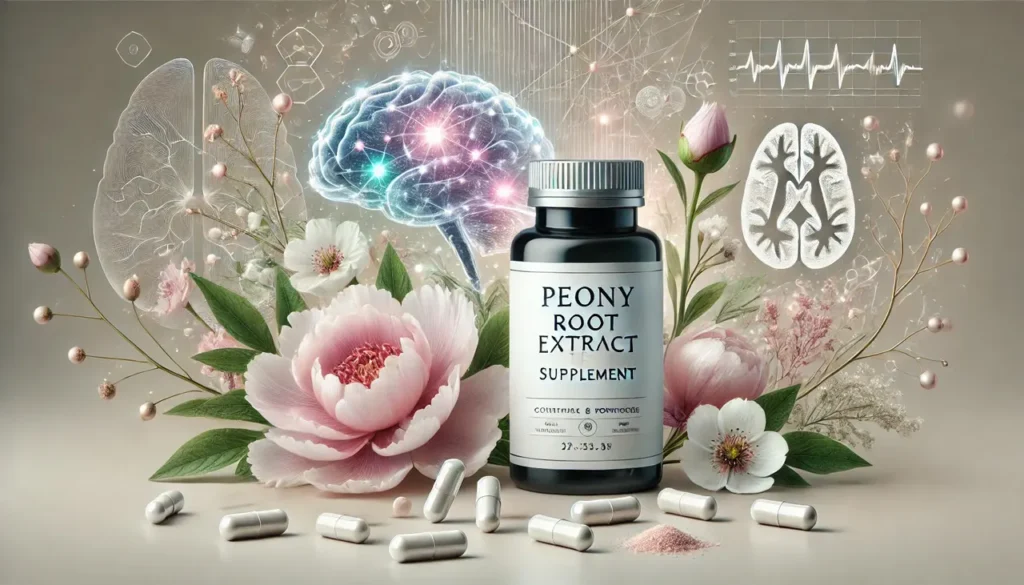Peony (Paeonia spp.), a plant with a rich history in traditional Chinese and Japanese medicine, is gaining attention in modern wellness communities for its potential nootropic properties. The genus Paeonia comprises several species, with Paeonia lactiflora and Paeonia suffruticosa being the most commonly studied for their medicinal properties. These plants have been traditionally used for their anti-inflammatory, antioxidant, and neuroprotective effects, which are linked to their bioactive compounds.
As the demand for natural nootropics continues to grow, the peony’s pharmacological profile is under scientific scrutiny for its potential role in enhancing cognitive function. This article delves into the chemistry, physiological mechanisms, potential cognitive benefits, dosing guidelines, side effects, and interactions of peony as a supplement.
You May Also Like:
Sources of Peony
Peony supplements are derived primarily from the roots and flowers of Paeonia lactiflora and Paeonia suffruticosa. These species have been used in traditional medicine for centuries, often in the form of dried roots, teas, and powdered extracts. Peony root extract is the most common form used in modern supplements, standardized to contain specific bioactive compounds that contribute to its potential health benefits.
The key bioactive compounds in peony include:
- Paeoniflorin: The most prominent and studied compound, paeoniflorin is a monoterpene glycoside with anti-inflammatory, neuroprotective, and antioxidant properties.
- Albiflorin: Another glycoside with similar properties to paeoniflorin, albiflorin contributes to peony’s calming and cognitive-enhancing effects.
- Tannins and Flavonoids: These compounds have antioxidant effects, protecting neurons from oxidative stress and inflammation, both of which are crucial for cognitive health.
Discover the Benefits of Peony for Brain Function and Mental Wellness—Buy Now on Amazon!

Chemistry of Peony
Peony’s therapeutic potential is attributed to its diverse array of phytochemicals. Paeoniflorin and albiflorin, the two major glycosides, exert neuroprotective and anti-inflammatory effects by modulating various biochemical pathways. Paeoniflorin’s chemical structure allows it to interact with specific receptors and enzymes in the brain, particularly those involved in neurotransmission and neuroinflammation.
- Paeoniflorin has a C23H28O11 molecular structure and is thought to inhibit inflammatory cytokines, modulate GABAergic activity, and improve mitochondrial function. Its neuroprotective effects are linked to its ability to scavenge free radicals, protect neurons from oxidative stress, and enhance the resilience of brain cells against damage.
- Flavonoids and Tannins in peony act as antioxidants, preventing cellular damage in the brain by neutralizing free radicals. This is particularly important for cognitive health, as oxidative damage can impair neuronal function and contribute to neurodegenerative diseases.

Physiological Mechanisms of Peony in the Body and Brain
The neuroprotective and nootropic effects of peony are largely attributed to its antioxidant and anti-inflammatory properties. The plant’s bioactive compounds, particularly paeoniflorin, work through several physiological mechanisms to support brain health:
- Antioxidant Defense: Peony’s flavonoids and glycosides help neutralize reactive oxygen species (ROS) that can cause oxidative damage to neurons. Oxidative stress is a significant contributor to cognitive decline and neurodegenerative diseases such as Alzheimer’s and Parkinson’s disease. By enhancing the brain’s antioxidant defenses, peony may protect against cognitive deterioration.
- Anti-inflammatory Effects: Chronic neuroinflammation is linked to cognitive impairment and brain aging. Peony’s ability to reduce the production of pro-inflammatory cytokines such as TNF-α and IL-6 helps lower inflammation in the brain, potentially preventing neurodegenerative conditions and improving cognitive function.
- Modulation of Neurotransmission: Peony compounds have been shown to influence neurotransmitter systems, particularly the GABAergic and serotonergic pathways. By enhancing GABA (gamma-aminobutyric acid) activity, paeoniflorin may reduce anxiety and promote relaxation, which can enhance cognitive performance in stressful environments. Peony also influences dopamine levels, contributing to improved mood and cognitive clarity.
- Neuroprotection Against Excitotoxicity: Excitotoxicity, caused by excessive stimulation of neurons by neurotransmitters such as glutamate, can lead to neuronal damage. Peony’s compounds help regulate glutamate release, reducing excitotoxic damage and promoting neuronal survival, which is critical for maintaining cognitive function.
Support Brain Health and Stress Relief with Scientifically Backed Peony Extract—Order Now on Amazon!

Nootropic Benefits of Peony
Peony’s potential as a nootropic supplement lies in its ability to support various aspects of cognitive health. Although research is still emerging, the following cognitive benefits are associated with peony:
- Enhanced Cognitive Function: The neuroprotective properties of paeoniflorin and albiflorin help prevent oxidative damage and inflammation in the brain, leading to improved cognitive performance. Studies suggest that these compounds can enhance memory, learning ability, and overall mental clarity by supporting healthy neuronal function.
- Improved Focus and Attention: By modulating GABAergic activity and reducing anxiety, peony may enhance focus and attention, especially in individuals experiencing stress or anxiety-related cognitive deficits. The plant’s calming effect can lead to improved concentration and sustained attention during mentally demanding tasks.
- Neuroprotective Effects: Peony’s antioxidant and anti-inflammatory properties contribute to its neuroprotective effects. These properties may reduce the risk of neurodegenerative diseases such as Alzheimer’s and Parkinson’s, which are characterized by oxidative stress and inflammation in the brain.
- Mood Regulation: The influence of paeoniflorin on the GABAergic and serotonergic systems suggests that peony may help regulate mood and reduce symptoms of anxiety and depression. By improving mood stability, peony may indirectly enhance cognitive performance, particularly in individuals with mood disorders.

Dosage and Supplementation Guidelines
While peony is generally considered safe, appropriate dosing is critical to avoid potential side effects and maximize its nootropic benefits. Peony is available in various forms, including capsules, powders, and teas. Standardized peony root extracts are typically used in supplements, ensuring consistent levels of bioactive compounds.
- General Nootropic Dosage: For cognitive enhancement, a typical dosage of peony root extract ranges from 300 mg to 600 mg per day, standardized to contain 2-3% paeoniflorin. This dosage is considered safe for most individuals and is sufficient to support brain health without causing adverse effects.
- Therapeutic Dosage: In traditional medicine, peony is often used at higher doses (up to 1,200 mg per day) for its anti-inflammatory and analgesic effects. However, for nootropic purposes, lower doses are generally recommended to minimize the risk of side effects.
- Supplement Forms: Peony is commonly available as a standalone supplement or combined with other herbs in formulas designed for cognitive support. It is important to choose supplements from reputable manufacturers that provide clear labeling of paeoniflorin content to ensure efficacy.
Fuel Your Mind and Support Nerve Health with Advanced Peony Extract—Shop Now on Amazon!

Side Effects and Safety
Peony is generally well-tolerated when taken at appropriate dosages. However, like any supplement, it may cause side effects in some individuals, especially when used in excess.
- Mild Side Effects: Common side effects of peony supplementation include gastrointestinal discomfort, nausea, and dizziness. These symptoms are usually mild and resolve with dose adjustments.
- Allergic Reactions: Rarely, individuals may experience allergic reactions to peony, including rashes, itching, or swelling. If any signs of an allergic reaction occur, supplementation should be discontinued immediately, and a healthcare provider should be consulted.
- Blood Thinning: Peony has been reported to have mild anticoagulant effects, which could increase the risk of bleeding in individuals taking blood-thinning medications or those with bleeding disorders. Caution is advised for such individuals, and peony should only be taken under medical supervision in these cases.
Interactions with Other Supplements and Medications
Peony may interact with certain medications and supplements, making it important to consult a healthcare provider before beginning supplementation, particularly if you are taking other substances.
- Blood Thinners: As mentioned, peony may have anticoagulant effects, which can interact with blood-thinning medications such as warfarin, aspirin, or other anticoagulants. Combining peony with these medications could increase the risk of bleeding.
- Immunosuppressants: Peony’s immune-modulating properties may interfere with immunosuppressive medications used by individuals with autoimmune conditions or those undergoing organ transplants. This interaction could reduce the effectiveness of immunosuppressants, potentially leading to adverse effects.
- Other Herbal Supplements: Peony is often combined with other herbal nootropics, such as ginkgo biloba or ashwagandha, in cognitive support formulas. While these combinations are generally safe, it is important to monitor for any potential side effects or interactions, particularly in individuals sensitive to multiple supplements.
Risks for Individuals with Certain Health Conditions
While peony is generally considered safe for healthy individuals, those with specific health conditions should exercise caution when using this supplement.
- Pregnancy and Breastfeeding: There is limited research on the safety of peony during pregnancy and breastfeeding. Due to its potential effects on hormone levels and blood clotting, peony is not recommended for use during these periods without medical supervision.
- Bleeding Disorders: As peony may have anticoagulant effects, individuals with bleeding disorders or those taking blood-thinning medications should avoid using peony without consulting a healthcare provider.
Support Cognitive Health and Emotional Balance with Premium Peony Supplements—Shop Today on Amazon!

Research on Peony and Cognitive Health
While peony has a long history of use in traditional medicine, modern scientific research on its nootropic effects is still in its early stages. Animal studies and preliminary clinical trials have provided promising evidence for peony’s cognitive benefits, particularly its neuroprotective, anti-inflammatory, and mood-enhancing properties.
In animal models, paeoniflorin has been shown to reduce cognitive impairment caused by oxidative stress and inflammation, suggesting potential applications in preventing age-related cognitive decline. However, more human clinical trials are needed to establish the efficacy and safety of peony as a nootropic supplement.
Conclusion
Peony holds significant potential as a natural nootropic supplement, thanks to its antioxidant, anti-inflammatory, and neuroprotective properties. Its bioactive compounds, particularly paeoniflorin, offer promising benefits for enhancing cognitive function, reducing neuroinflammation, and protecting against oxidative damage. While more research is needed to fully understand its mechanisms and long-term effects, peony is a promising candidate for individuals seeking natural ways to support brain health and cognitive performance.
As with any supplement, it is important to consult with a healthcare provider before starting peony, especially if you have underlying health conditions or are taking other medications. When used appropriately, peony may offer a natural and effective way to enhance cognitive function and support overall brain health.

References:
- Peony. Retrieved from: https://www.rxlist.com/supplements/peony.htm
- Anti-Inflammatory and Immunomodulatory Effects of Paeonia Lactiflora Pall., a Traditional Chinese Herbal Medicine. Retrieved from: https://pmc.ncbi.nlm.nih.gov/articles/PMC3108611/
- Recent Insights into the Protective Mechanisms of Paeoniflorin in Neurological, Cardiovascular, and Renal Diseases. Retrieved from: https://pmc.ncbi.nlm.nih.gov/articles/PMC8169546/
- Peony and its major constituent, paeoniflorin, improve radial maze performance impaired by scopolamine in rats. Retrieved from: https://pubmed.ncbi.nlm.nih.gov/8332629/#:~:text=These%20data%20suggest%20that%20peony,active%20constituents%20of%20peony%20root.
Important Note: The information contained in this article is for general informational purposes only, and should not be construed as health or medical advice, nor is it intended to diagnose, prevent, treat, or cure any disease or health condition. Before embarking on any diet, fitness regimen, or program of nutritional supplementation, it is advisable to consult your healthcare professional in order to determine its safety and probable efficacy in terms of your individual state of health.
Regarding Nutritional Supplements Or Other Non-Prescription Health Products: If any nutritional supplements or other non-prescription health products are mentioned in the foregoing article, any claims or statements made about them have not been evaluated by the U.S. Food and Drug Administration, and such nutritional supplements or other health products are not intended to diagnose, treat, cure, or prevent any disease.


